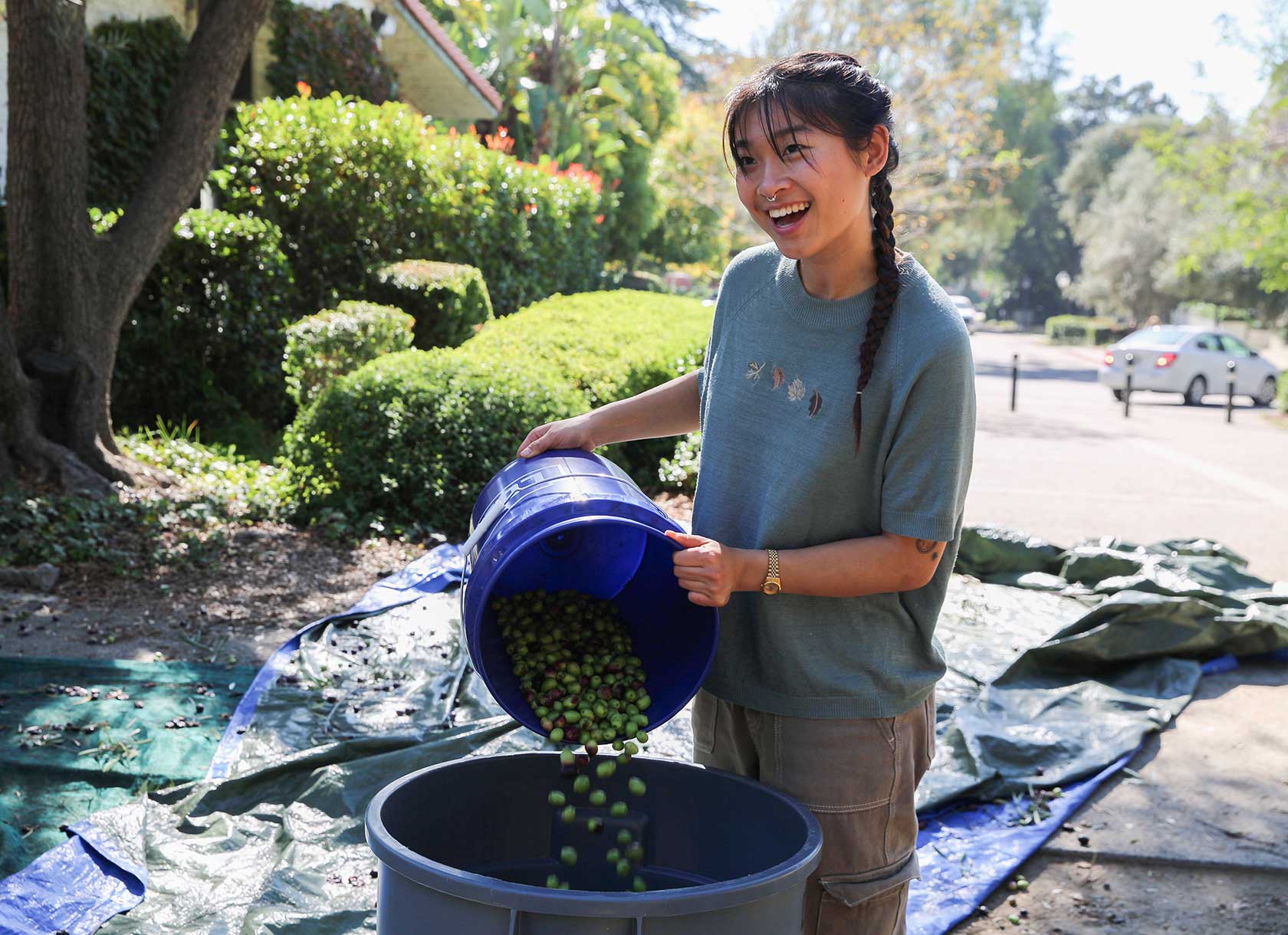
On November 5, Scripps hosted its traditional Olive Harvest, an event that furthers the College’s sustainability efforts by utilizing the campus’s edible plants as a food source. More than 200 students, faculty, staff, and members of the surrounding Claremont community harvested approximately 700 pounds of olives. The harvested fruit will be pressed into olive oil, which has previously received recognition in international competitions. This year, a limited number of bottles will be available for sale in the College’s official online store, the Browsing Room.
“The olive harvest brings together Scripps’ core values of community, inclusivity, and experiential learning and amplifies them through an opportunity to press pause on class and work deadlines,” said Joya Salas, the College’s landscape operations manager. “This event also highlights the intentionality of the original landscape design—to honor, utilize, and embrace seasonality for the benefit of the students.”
Olive trees have been part of the Scripps campus since the 1930s, but other groves were removed over the years to allow for the planting of Elm Tree Lawn and the construction of the Dorothy M. Drake Wing of Denison Library. When the decision was made in the late 1960s to build the Bette Cree Edwards Humanities Building on its current site, students protested until a compromise was reached and 60 olive trees were preserved for replanting in the building’s courtyard. Forty years later, students in Professor of Politics Nancy Neiman’s Core II class, The Politics of Culture and Food, proposed the creation of more sustainability-focused programs across the Scripps campus. Inspired by the course, students advocated for the use of Scripps’ edible plants as a resource, and a new tradition was born: Since 2012, Scripps has invited Claremont College students, faculty, and staff, as well as the local community, to participate in harvesting the College’s olives when conditions have been ripe.
Prior to this year, the most recent harvest took place in November 2019, after a three-year hiatus due to drought and water restrictions. The COVID-19 pandemic and remote instruction prevented any potential on-campus harvest in 2020.
Sable Fest ’22 said she was excited to participate in the harvest for the first time. Because of her interest in food, she explained, she found the experience of helping the campus’s olives become olive oil educational. “It’s fascinating to watch and be part of the process,” she said, adding that it was a chance for her to spend time with the Scripps community, working toward a shared goal.
“From the start, this project has been about building community,” Neiman agreed. “This year’s olive harvest is particularly meaningful because it has been so challenging to build and maintain a sense of community during the pandemic. The harvest gets people out on campus to do something that is so tied to place and nature.”
The joy of reconnection was a common theme among this year’s harvest volunteers, which included members of the Scripps College Gardening Club, representatives from the Scripps Associated Students Sustainability Committee, Laspa Center for Leadership Scholars-in-Action, alum Sally Monastiere ’67, and emerita faculty member Jane O’Donnell, who was the first Bessie and Cecil Frankel Chair in Music. Participants highlighted the value of building community face-to-face after more than a year of remote instruction. “It’s important to take part in in-person traditions, especially an event as quintessential to the history of Scripps,” said Steve Flores, assistant director of alumnae engagement. Ajahanah Hall, events coordinator, added that it was a beautiful way for everyone to join together—and a good source of stress relief after the anxiety of the pandemic.
Because the harvest is large in scope, the participation of the whole community is vital to its success. Neiman said that her involvement in the olive oil project has made a huge difference in her life as a Scripps faculty member, especially because of the relationships she’s been able to build with the grounds team. Groundskeeper Ramón Estrada, who helps maintain the College’s landscaping year-round and who delivered the harvested olives to the miller, explained that the event also provides an opportunity for the groundskeeping crew and the student body to learn from each other. “It’s nice to work with the students so that they can see more of what we do,” he said. “It’s an educational experience.”
Added Neiman: “It’s the one place where you can chat casually among students, faculty, staff, board members, parents, and folks from the broader community. It’s kind of ‘organic.’”

